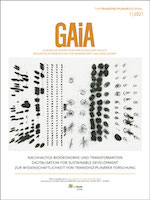
GAIA-Ecological Perspectives for Science and Society
Scope & Guideline
Transforming Perspectives on Ecology and Economics
Introduction
Aims and Scopes
- Transdisciplinary Research:
The journal emphasizes transdisciplinary approaches, integrating knowledge from various disciplines to address complex sustainability challenges. This methodology encourages collaboration between academia, policy, and civil society. - Socio-Ecological Transformation:
Research published in GAIA addresses the need for socio-ecological transformation, focusing on how societies can adapt to and mitigate the impacts of climate change and environmental degradation. - Participatory Methods:
The journal promotes participatory research methods that involve stakeholders in the research process, ensuring that diverse perspectives are considered in sustainability solutions. - Innovation for Sustainability:
GAIA highlights innovative practices and research that contribute to sustainability, exploring new technologies, governance models, and social innovations that can drive ecological and social change. - Ethics and Responsibility:
The journal also engages with ethical considerations surrounding sustainability, advocating for corporate responsibility and the equitable distribution of resources in the context of environmental justice.
Trending and Emerging
- Real-World Laboratories:
The concept of real-world laboratories has gained traction, emphasizing experimental and participatory approaches to sustainability that allow for testing and scaling innovative solutions in real-life contexts. - Digitalization and Sustainability:
There is a growing interest in the intersection of digital technologies and sustainability, exploring how digitalization can support sustainable practices while addressing associated risks and challenges. - Climate Justice and Social Equity:
Research focusing on climate justice and the social dimensions of sustainability has emerged as a priority, reflecting a recognition of the need to address inequalities exacerbated by environmental issues. - Behavioral Insights and Nudges:
The application of behavioral insights to encourage sustainable consumption and lifestyle changes is trending, with increasing attention to how social norms and psychological factors influence environmental behavior. - Biodiversity and Ecosystem Services:
An increasing number of papers are exploring the relationship between biodiversity conservation and ecosystem services, highlighting their importance in sustainability frameworks and policy.
Declining or Waning
- Traditional Environmental Management:
There has been a noticeable decline in papers focusing solely on traditional environmental management practices, which are increasingly viewed as insufficient for addressing the complexity of modern socio-ecological challenges. - Narrowly Defined Agricultural Practices:
Research specifically centered on conventional agricultural practices, without consideration of broader ecological impacts or innovative practices, has decreased as the journal shifts towards more integrative and systems-oriented approaches. - Static Policy Proposals:
Papers proposing static or one-size-fits-all policy solutions have waned, as the discourse now favors dynamic, adaptive governance models that can respond to rapidly changing environmental conditions.
Similar Journals

One Earth
Advancing the frontiers of Earth and Environmental Science.One Earth is a premier academic journal published by Cell Press, dedicated to advancing research in the fields of Earth and Planetary Sciences as well as Environmental Science. With an impactful presence in the academic community and an impressive ranking, One Earth has achieved Q1 status in both Earth and Planetary Sciences and Environmental Science, showing its commitment to the highest standards of scholarly excellence. Founded in 2019, this journal has quickly established itself as a leading platform for groundbreaking research, contributing to the global conversation on sustainability and environmental stewardship. With a distinguished Scopus rank placing it in the 99th percentile among Earth and Planetary Sciences and the 97th percentile in General Environmental Science categories, One Earth aims to disseminate cutting-edge findings and foster innovative approaches to address pressing global challenges. The journal is indexed with an ISSN of 2590-3330 and an E-ISSN of 2590-3322, supporting a broad audience of researchers, professionals, and students passionate about ecological integrity and planetary health.

Intangible Capital
Fostering Innovation through Open AccessIntangible Capital is a distinguished journal published by OMNIASCIENCE, dedicated to advancing knowledge in the realms of Accounting, Business and International Management, Education, and more. Established in 2004 as an open-access platform, the journal facilitates the dissemination of innovative research insights from Spain, and it continues to thrive with a commitment to accessibility and global outreach. With its impressive rankings in the Scopus directory, positioned in the Q3 and Q4 quartiles across various categories, Intangible Capital serves as a vital resource for researchers and practitioners alike, navigating through the complexities of organizational behavior, strategic management, and technological innovation. The journal's annual publish window from 2009 to 2024 speaks to its longevity and ongoing relevance in the academic landscape, enabling scholars to contribute to discussions that shape contemporary practices and policies in their respective fields.
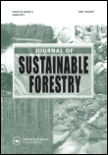
Journal of Sustainable Forestry
Cultivating a sustainable future through research and collaboration.Journal of Sustainable Forestry is a premier academic publication dedicated to advancing knowledge and practices in the field of sustainable forestry and environmental management. Published by Taylor & Francis Inc in the United Kingdom, this journal has been a cornerstone for researchers and professionals since its inception in 1992. With an impressive reputation, it boasts a 2023 Q2 ranking in Food Science, Forestry, and Geography, Planning and Development, highlighting its significant contribution to interrelated disciplines. The journal’s impact is further underscored by its Scopus ranking, especially in Forestry where it holds the 43rd position out of 174 publications, placing it in the 75th percentile. Although not open access, the journal remains committed to providing innovative research and practical insights into forest management, ecological sustainability, and policy development. As the field of sustainable forestry continues to evolve, the Journal of Sustainable Forestry serves as an essential resource for those committed to advancing sustainable practices globally, fostering a deeper understanding of how sustainable forestry can contribute to environmental resilience and biodiversity conservation.
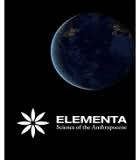
Elementa-Science of the Anthropocene
Pioneering open-access solutions for pressing environmental challenges.Elementa: Science of the Anthropocene is an esteemed Open Access journal published by University of California Press, dedicated to advancing interdisciplinary research that addresses the complexities of the Anthropocene epoch. Since its inception in 2013, it has established itself as a leading platform for the dissemination of innovative ideas across several disciplines, including atmospheric science, ecology, environmental engineering, geology, geotechnical engineering, and oceanography, achieving Q1 status in each of these fields as of 2023. With an impact factor reflecting its significant contribution to the scholarly community, Elementa ranks favorably in various Scopus categories, being placed in the 88th percentile in Earth and Planetary Sciences for both Geology and Oceanography. The journal's open-access model ensures that valuable research findings are accessible to a broader audience, fostering collaboration among researchers, professionals, and students dedicated to tackling pressing environmental challenges. Located in Oakland, California, Elementa continues to uphold a mission that underscores the importance of sustainable solutions and comprehensive understanding of the Anthropocene.
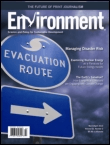
ENVIRONMENT
Fostering Insightful Dialogue on Ecological ChallengesENVIRONMENT is a premier journal published by Routledge Journals, Taylor & Francis Ltd, focusing on interdisciplinary studies in the field of environmental science. With the ISSN 0013-9157 and E-ISSN 1939-9154, this journal serves as a vital platform for the dissemination of high-quality research and innovative ideas that address contemporary environmental challenges. Spanning over five decades since its inception in 1969, the journal boasts an impressive impact factor and is recognized in multiple prestigious categories: Q1 in Environmental Engineering and Water Science and Technology, as well as Q2 rankings in Global and Planetary Change and Renewable Energy, Sustainability, and the Environment. Covering a diverse scope from ecological studies to sustainable technologies, it attracts a global readership comprised of researchers, professionals, and students committed to driving progress in environmental sustainability. Although currently not an open-access journal, it offers essential insights and empirical findings crucial for policy development and practical applications in the world of environmental science. The journal not only contributes to scholarly discourse but also plays a significant role in shaping future research directions and fostering a deeper understanding of the intricate relationships between humans and their environment.
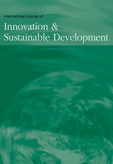
International Journal of Innovation and Sustainable Development
Illuminating Pathways to Sustainable InnovationThe International Journal of Innovation and Sustainable Development, published by INDERSCIENCE ENTERPRISES LTD, is a pivotal platform for researchers, professionals, and students interested in areas such as management of technology and innovation, as well as renewable energy and sustainability. Since its inception in 2005, this journal has aimed to disseminate high-quality research that addresses the urgent challenges of innovation in the context of sustainability. Located in the United Kingdom with an outreach extending to a global audience, the journal features a diverse range of articles aimed at fostering interdisciplinary collaboration. With an increasing importance in today’s rapidly evolving societal and environmental landscape, this journal provides essential insights and advancements in its fields of study, which are crucial for informed decision-making and policy formulation. Although currently placed in the lower quartiles of its categories, the journal still plays an essential role in nurturing new ideas and facilitating discussions that can lead to impactful advancements in innovation and sustainability.

Revista Cooperativismo y Desarrollo-COODES
Advancing cooperative knowledge for sustainable futures.Revista Cooperativismo y Desarrollo-COODES is an esteemed academic journal dedicated to the fields of cooperative studies and sustainable development, particularly in the context of Latin America. Published by UNIV PINAR RIO HERMANOS SAIZ MONTES OCA in Cuba, this journal has embraced Open Access since 2013, ensuring that knowledge related to cooperative practices and developmental strategies is broadly disseminated to researchers, practitioners, and scholars alike. With an ISSN of 2310-340X, COODES provides a platform for innovative research and discourse on the roles of cooperatives in social and economic development, thus contributing significantly to the academic community and policy-making discussions. Despite the absence of specific metrics like the H-index or Scopus ranking, the journal is committed to fostering interdisciplinarity and advancing cooperation as a vital mechanism for sustainable growth. Researchers and professionals in the field are encouraged to contribute their findings and insights, enhancing the dialogue around cooperative movements in contemporary society.

REUNIR-Revista de Administracao Contabilidade e Sustentabilidade
Illuminating pathways to effective organizational management.REUNIR-Revista de Administração Contabilidade e Sustentabilidade is a prominent academic journal published by the Universidade Federal de Campina Grande, under the auspices of the Centro Ciências Jurídicas e Sociais. With a dedicated focus on the intersection of administration, accounting, and sustainability, this journal serves as a vital platform for researchers, professionals, and students seeking to explore innovative practices and theories within these fields. Although currently not classified as Open Access, it maintains a commitment to disseminating high-quality research, thereby fostering scholarly dialogue and practical application. The journal adheres to rigorous academic standards and aims to contribute significantly to understanding sustainable management practices in various organizational contexts. As it evolves, REUNIR promises to be an essential resource for those dedicated to advancing knowledge and implementing effective solutions in administration and sustainability.
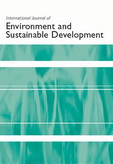
International Journal of Environment and Sustainable Development
Innovating pathways for a greener planet.The International Journal of Environment and Sustainable Development, published by INDERSCIENCE ENTERPRISES LTD, serves as a vital platform for researchers, practitioners, and policymakers engaged in the multidisciplinary fields of geography, renewable energy, and environmental sustainability. With an ISSN of 1474-6778 and an E-ISSN of 1478-7466, this journal has been disseminating critical research since its inception in 2002 and continues to expand its scope through 2024. Recognized within the Q3 quartile in Geography, Planning and Development and Q4 in both Management, Monitoring, Policy and Law and Renewable Energy, Sustainability and the Environment, it provides valuable insights into contemporary issues affecting our planet. While access options are limited to non-open access formats, the journal remains essential for those seeking to enhance their understanding of sustainable development practices and policies in a global context. The International Journal of Environment and Sustainable Development is not only an academic repository but also a catalyst for dialogue and innovation within the environmental sciences.
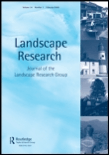
Landscape Research
Fostering Interdisciplinary Dialogues in Landscape StudiesLandscape Research is a distinguished scholarly journal published by Routledge Journals, Taylor & Francis Ltd, dedicated to the interdisciplinary study of landscapes, their management, and preservation. With an ISSN of 0142-6397 and an E-ISSN of 1469-9710, this journal has been an essential platform for advancing knowledge since its inception in 1970 and is currently indexed until 2024. It occupies a significant place within the academic community, evidenced by its impactful rankings, holding a Q2 classification in multiple categories including Environmental Science, Geography, Planning and Development, and Nature and Landscape Conservation for 2023. The journal ranks within the top quartiles of their respective fields, exemplifying its commitment to high-quality research and discussions that shape landscape policy and conservation strategies. Researchers, professionals, and students engaged in these essential areas will find Landscape Research an invaluable resource, providing insights that contribute to sustainable practices and the thoughtful development of our environments.